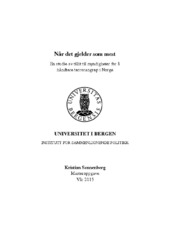Når det gjelder som mest. En studie av tillit til myndigheter for å håndtere terrorangrep i Norge
Abstract
The purpose of this thesis is to examine to what extent trust in authorities' ability to handle a terrorist attack can be explained by policy distance. The level of trust in political institutions in Norway is generally higher than in most other countries. But trust related to preparedness against terrorism has been low after the July 22, 2011 attacks. Therefore this study introduces a new dependent variable: Trust in authorities' ability to handle terrorist attacks. Building on previous studies of trust in crisis management, this study focuses on political factors in the explanation of variations in trust. It applies descriptive statistics and regression analysis to 2013- and 2014-data from the Norwegian Citizenship Panel, testing three hypotheses related to policy distance. The main goal of this thesis is to determine the relative explanatory power of: 1) vote for one of the parties in cabinet, 2) satisfaction with incumbent cabinet, and 3) satisfaction with democracy, on peoples trust in authorities' ability to handle a terrorist attack. The main finding of this study is that trust can only to a limited extent be explained by policy distance. Trust varies among voters of the main political parties, but the dissimilarities does not stem from winners and losers of governing power. Neither voting for one of the parties in cabinet, nor being satisfied with the incumbent cabinet, does significantly affect trust positively. Variations in trust can mostly be explained by the third hypothesis. Trust in authorities' ability to handle a terrorist attack is significantly higher among individuals who are satisfied with the way democracy works.
